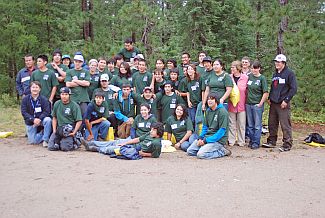 Thunder Bay's Confederation College has become a key player in First Nation employment training for northwestern Ontario's mining sector.
Thunder Bay's Confederation College has become a key player in First Nation employment training for northwestern Ontario's mining sector.
The Mineral Prospecting Program and the First Nations Natural Resources Youth Employment Program educate and train Aboriginals in a variety of skills required by mining companies.
The fledgling Mineral Prospecting Program began August 10 and wrapped up November 20th. The 15-week course resulted from a request by mining companies and Aboriginal communities in northwestern Ontario to provide training for First Nations in order to meet employment targets set by Impact Benefit Agreements, according to John Hatton, director of training and development with Confederation College.
Originally, a five-week linecutting course was offered to prepare First Nation people to work for junior miners during the exploration boom a few years ago. This led to other courses focusing on surface diamond drilling and cooking, for example, which provided training in different skill sets.
The employment opportunities that resulted from these courses then led to the development of a 15-week Mineral Prospecting Program.
Three-way partnership
"It was brainstorming from the mining companies, the Ontario Geological Survey and the First Nations," Hatton said, emphasizing that the partnership between First Nation communities, the private sector, the college and the OGS serves as a model that works well.The program includes theory and fieldwork. Topics cover safety certification, introduction to mineral exploration, basic geology, GPS applications, prospecting and claim staking, geophysics, geology fieldwork and map interpretation, sampling techniques and the business aspect of mineral exploration.
The college delivers the program in collaboration with Bending Lake Iron Group Ltd., an Aboriginal exploration company that is evaluating an iron deposit near Bending Lake, between Ignace and Atikokan.
"We're using their camp," Hatton said. "It is a real fieldwork situation."
The teaching staff is comprised of veteran geologists and a business expert with more than 30 years experience in industry.
"The small business component was something they (First Nations) thought was really important," Hatton said, noting their entrepreneurial spirit and desire to create economic independence.
The course fee of $15,000 per person covers instruction, equipment, 10 weeks of accommodation and food in the camp, and transportation back and forth. A $250,000 government grant provides a $10,000 subsidy per student. The remaining $5,000 is funded by the band or student. Those interested are interviewed for basic literacy and math skills, and are made aware of the expectations and course content.
Ten students, including nine Aboriginals, participated in the first offering. The course equipped them with prospecting skills, giving them employable skills and the ability to start their own business.
"When they get out here, they can comfortably go into the bush, make an educated assessment of mineral deposits and use some of the higher-tech pieces of equipment" Hatton said.
Youth employment
Another program designed to entice Aboriginal youth participation and build capacity is the First Nations Natural Resources Youth Employment Program. It is offered through the college's Natural Resource Centre (NRC) in partnership with First Nations, industry and government as a summer course teaching basic skills for the natural resource industries.The two-year program offers youth a safe, structured and predictable work environment in which a combination of natural resources training, tours and personal growth and development workshops are weaved together. Year-one youth must be attending high school and plan on returning in the fall. Year-two youth must be in high school or have graduated. The focus is on teaching youth essential skills, workplace health and safety, workplace ethics and teamwork.
The program began in 2000 in partnership with Bowater, Inc., a pulp and paper and wood products company in northwestern Ontario. In 2003, it merged with a similar program sponsored by Weyerhaeuser in Dryden, and Confederation College's Natural Resource Centre came on board to administer the program, said NRC's general manager Brian Kurikka. Now, several First Nation communities, private companies and government ministries have partnered to help fund and/or offer in-kind services.
Although the primary focus has been on forestry, groups like Marathon PGM, the Prospectors and Developers Association of Canada (PDAC) Mining Matters and the Ministry of Northern Development, Mines and Forestry (MNDMF) are coming on board to help educate students about the mining sector.
"About four years ago, we saw the need to shift and open up other opportunities like mining and the environment," said Kurikka.
"MNDMF did a two-day introduction to prospecting and claim staking course. PDAC Mining Matters delivered a wonderful, one-week program on mining and Marathon PGM provided some funding."
Kurikka said a lot of the skills learned for forestry are transferable to mining - for example, GPS and GIS technology, species at risk, safe chainsaw handling, emergency first aid and WHMIS.
The benefits include paid summer employment, opening educational doors to pursue future studies, and capacity building, making youth more employable, which in the long term, will improve their socioeconomic situation.
Since the start of the program, 222 youth representing 31 First Nation communities have participated in the program, 405 summer job placements have been created, and an additional 175 summer job placements for graduates were made available by Outland Reforestation, a company that helped to deliver the program.
Many success stories have resulted. Some students have pursued post-secondary education, while others obtained employment either in the forestry or mining industries.
Phil Pelletier, community service manager for the Fort William First Nation, has worked closely with the program since its inception and vouches for its success.
"It has matured some of the kids," he said. "It is a good learning experience. If we can get more kids integrated into the system, they'll have an easier transition finding employment later on in life."
Both Pelletier and Kurikka would like to see more mining partners get involved, grow the program, and create a sustainable funding model.
"Ideally, we'd like to see three camps: one each in northeastern, north central and northwestern Ontario," Kurikka said.

